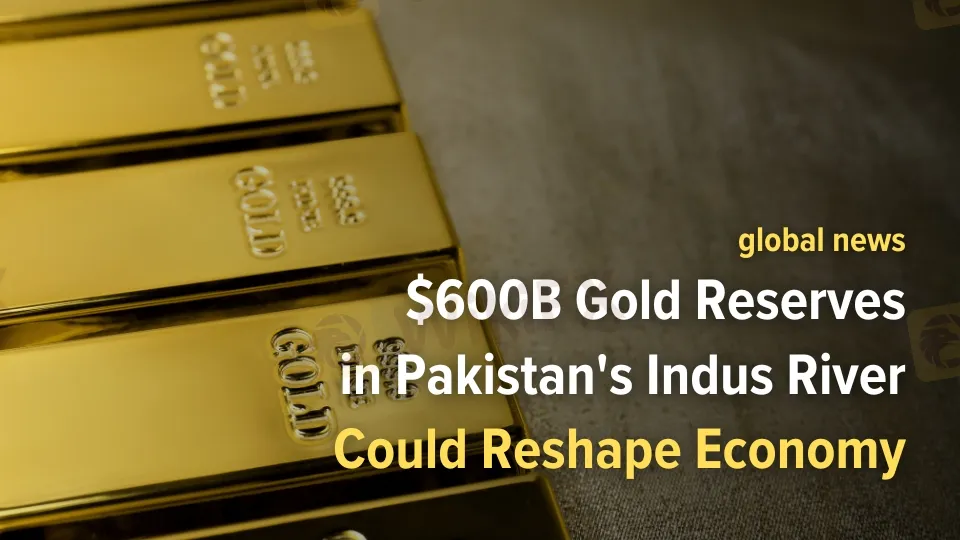$600B Gold Reserves in Pakistan's Indus River Could Reshape Economy
abstrak:Breaking: Pakistan uncovers gold deposits worth 600B PKR in the Indus River, sparking hopes for economic revival and sustainable resource development.

The Indus River, a Historical and Economic Lifeline
For thousands of years, the Indus River, respected for its historical significance, has served as a lifeblood for civilizations. The river, which served as the birthplace of the Indus Valley Civilization, which thrived between 3300 and 1300 BCE, represented prosperity, invention, and expansion. This historic river now bears fresh potential in the form of significant gold reserves discovered in Pakistan's Punjab region near Attock. With a potential value of 600 billion Pakistani rupees, this finding might usher in a new era in the river's history, providing optimism for Pakistan's economic change.
The Geological Journey of Gold to the Indus River
The gold deposits in the Indus River are the consequence of millions of years of geological processes. Gold particles developed in the Himalayas, one of the world's most geologically active places, as tectonic plates clashed to construct the mountain range. Natural erosion eventually dispersed these particles into rivers like the Indus. The particles were transported downstream by fast-flowing rivers and finally deposited in the riverbed as placer gold deposits.
According to reports, a 32-kilometer section of the Indus River near Attock is particularly gold-rich, with estimations showing the presence of 32.6 metric tons of the golden metal. This amazing concentration highlights the enormous geological forces that have created the area, as well as the prospects they provide for Pakistan today.
Illegal Mining: An Immediate Challenge
The discovery of gold reserves has caused a frenzy among surrounding communities, with many engaged in illicit mining to harvest gold from the riverbed. These activities are especially common in the winter, when the river's water levels are lower, making gold particles more accessible. However, these attempts frequently make use of heavy gear, which can harm the environment and destabilize local ecosystems.

In response, the government has implemented Section 144, a legislative tool designed to combat unlawful activity in the region. Despite these attempts, enforcement is very inadequate, and illicit mining remains a big concern.
Bureaucratic Barriers to Gold Exploration
While the finding has sparked interest, progress in investigating and mining the gold riches has been stymied by bureaucratic bottlenecks. According to media reports, officials in the Mines and Minerals Department have expressed little interest in prioritizing gold exploration. Instead, attempts have been made to assign locations for sand and stone zinc mining, diverting focus away from the economic possibilities of gold production.
This lack of focus underlines the necessity for the government to take a deliberate and coordinated approach to ensuring that gold reserves are used ethically and effectively.
Economic Opportunities and Impact
If carefully exploited, the gold resources of the Indus River might provide significant economic advantages to Pakistan.
- Increased National Revenue: The anticipated 600 billion rupees might help reduce Pakistan's increasing national debt and stabilize its economy.
- Job Creation and Local Economic Growth: Legal mining activities might provide thousands of jobs, providing a steady income for local people and driving economic growth in impoverished areas like Attock.
- Investment in Infrastructure: Mining revenue might be reinvested in infrastructure, such as roads, schools, and healthcare facilities, therefore enhancing inhabitants' quality of life.
Challenges to Responsible Gold Mining
While the economic potential is clear, numerous problems must be solved to guarantee that gold mining benefits Pakistan long-term:
- Environmental Concerns: If mining is not adequately managed, it may cause considerable environmental damage, such as river pollution, habitat destruction, and soil erosion.
- Illegal Mining: Unchecked illegal mining might deplete resources and cause social and environmental problems.
- Regulatory Weakness: The lack of rigorous mining legislation and adequate enforcement procedures may stymie growth and lead to resource misuse.
Final Thoughts
The finding of gold reserves in the Indus River presents Pakistan with a one-of-a-kind opportunity to transform its economic future. This newly discovered treasure has the ability to ease financial difficulties, reduce national debt, and open up new chances for employment and growth. To reap these benefits, the government must implement a multifaceted policy that promotes ethical mining, enforces stringent laws, and maintains resource management transparency.
Equally crucial is the necessity to address environmental sustainability and the long-term effects of mining activities on the river's ecology. Pakistan can turn the Indus River from a historical gem to a symbol of modern wealth by balancing commercial objectives with environmental protection. By doing so, the country not only honors the heritage of one of the world's oldest rivers but also secures its continuing relevance for future generations.

Broker ng WikiFX
Exchange Rate

